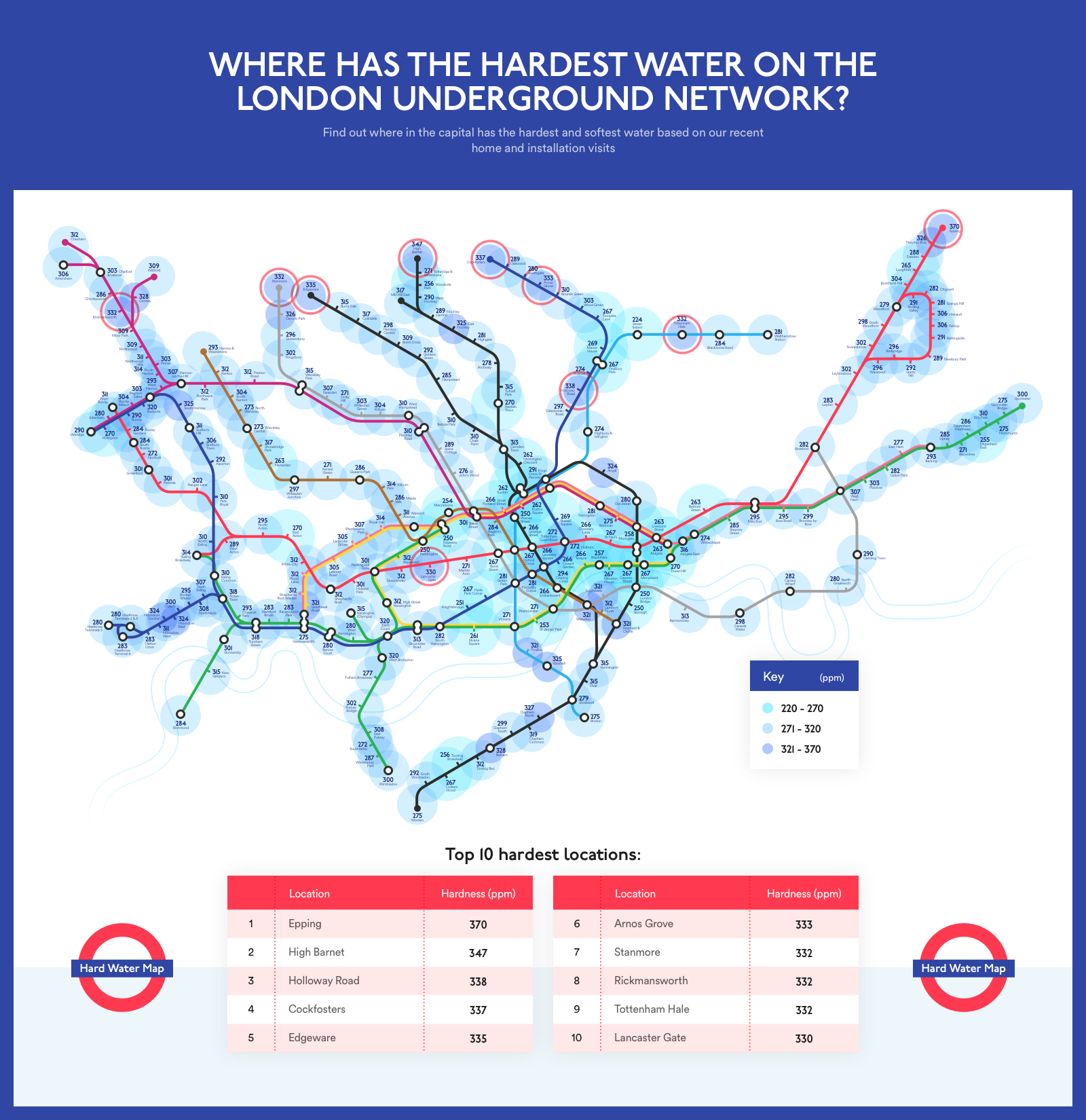WHERE IS LONDON’S HARDEST WATER?
Epping, High Barnet and Holloway Road have the hardest water in Greater London according to the findings of a new study of more than 42,000 UK properties.

The results of the London Hard Water Index reveal the latest hard water readings across Greater London, with each of the capital’s postcodes represented by its closest underground station on a new version of the tube map.
At 370ppm, Epping (CM16) was found to have the hardest water across the network, followed by High Barnet (EN5) at 347ppm and Holloway Road (N7) at 338ppm. The average for London as a whole is 293ppm, and to put this into context with some other UK cities, Edinburgh’s average reading is 23ppm and Birmingham 44ppm.
The average parts per million (ppm) represents the amount of calcium carbonate per litre levels for each area – the metric used to measure the severity of hard water.
The ten hardest locations were as follows:
Epping (CM16) – 370ppm
High Barnet (EN5) – 347ppm
Holloway Road (N7) – 338ppm
Cockfosters (EN4) – 337ppm
Edgeware (HA8) – 335ppm
Arnos Grove (N11) – 333ppm
Stanmore (HA7) – 332ppm
Rickmansworth (WD3) – 332ppm
Tottenham Hale (N17) – 332ppm
Lancaster Gate (W2) – 330ppm
Compared to the national average, all of London’s water is hard, however the findings suggest that there is variance across the city, with certain locations prone to extremely high levels of calcium carbonate, resulting in significant limescale and potentially secondary impacts to residents including skin damage and higher bills.
The study also investigated if there was North v South of the river divide to identify which side really was harder. The average reading for postcodes south of the Thames was 296ppm, just pipping the North at 293ppm.
With Thames Water being the city’s main supplier of water, it’s hardness is due to London’s location and its close proximity to limestone and chalky rock. When water percolates through these types of rock it increases its calcium carbonate levels meaning the majority of the South East is affected by hard water.
Tony Jones, General Manager at Harvey Water Softeners, said:
“While many people often refer to how the hardness of water can affect its taste, it’s actually the other implications of hard water on the home and to lives in general that are greater causes for concern.
“If you have moved to London from elsewhere in the UK, particularly from the north or west, you may have noticed it’s harder to give your home that shiny finish when cleaning and this is typically due to the limescale and scum caused as a result of hard water. It can even affect how you wash your hair, clean your car and how you ensure your skin feels moisturised throughout the day.”
How the water quality in your area might be affecting residents in Greater London:
Home
Ever noticed the white build up on your shower, taps and kettle? Well, that’s limescale – and it’s caused by hard water. The lower your hardness levels, the less you’ll suffer from limescale build up – and the less time you’ll have to spend cleaning!
Skin
Scientific research has proven a link between water quality and skin conditions like eczema and dryness. The excess of minerals in hard water can damage the protective layer on your skin exacerbating existing skin conditions for you and your family.
Hair
Hard water is associated with dull, lifeless hair. That means the higher your water hardness levels, the less likely you are to be able to achieve the kind of luscious, glossy locks we all dream of, no matter what products you use.
Appliances
The quality of your water can affect the lifespan and effectiveness of your appliances. If you have particularly hard water, the higher levels of minerals in that water have the potential of lining your pipes and the inner workings of your appliances and harming them as a result.
Bills
Because of all the impacts of poor quality water, you might find your bills really build up, from things like product usage to the need for skin and hair care products to the effect on your appliances and pipe work.
